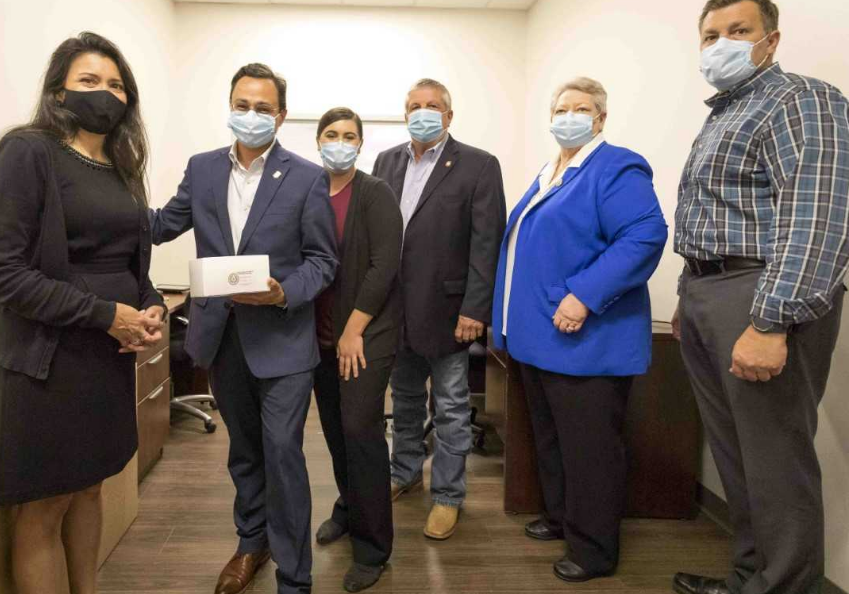
- Details
- By Chuck Hoskin Jr
When COVID-19 first reached Cherokee Nation and Oklahoma last year, we had many unanswered questions about how to fight this new disease. Now, thanks to the hard work of scientists, doctors and public health professionals, we know much more. Wearing masks and social distancing indoors are proven to slow the spread of the virus, and getting vaccinated is the best way to protect ourselves from serious illness and death.
With this new understanding, we made it through the first wave of the pandemic. Unfortunately, the Delta variant has brought another surge of COVID-19 cases. While more Cherokees and Oklahomans get vaccinated, and while we wait for the vaccine to be approved for children under 12, we must use proven strategies to stop the virus from spreading further.
Want more Native News? Get the free daily newsletter today.
Children and young people are of special concern right now. Many of our kids are returning to in-person classes without yet being able to get vaccinated. People who are fully vaccinated against COVID-19 have protection against severe disease, including from the Delta variant, but anyone who is unvaccinated and not practicing preventive strategies is at risk for hospitalization or even death.
Hospitals in Oklahoma were already struggling to maintain enough staff after such a grueling year battling the pandemic, and the surge has strained them even further. In the past month, hospitals have run out of ICU beds and pediatric beds on multiple occasions. Patients have had long waits for necessary care, and some have even had to go hundreds of miles out of state to find an available bed. Even with our expanded hospital capacity at Cherokee Nation to respond to COVID, staff and patients often face difficult choices.

Cherokee Nation is making every effort to protect our communities, and the Cherokee Nation Public Health Department has provided guidance to reduce the risk of infection in schools. This guidance follows CDC recommendations for safety. Our Cherokee Nation employees continue to rely on these same recommendations to help prevent the spread of COVID-19 at government buildings, business entities and health center facilities.
As a sovereign nation, we are following such guidelines in our own Sequoyah High School and Cherokee Immersion School, including implementing a mask mandate and other measures. Students, staff and teachers will be tested for COVID on a regular basis. Vaccines will be required for those participating in extracurricular activities. Students also have a virtual option, and those who choose that option will be fully supported. All of this means that in-person school instruction and extracurricular activities can safely proceed as planned.
I am mystified as to why the state of Oklahoma has made it illegal for Oklahoma public schools to do the same. As Principal Chief of the Cherokee Nation, I am strongly encouraging all school systems on our reservation and across the state to follow these best practices to protect students, teachers, staff, visitors and members of their households.
I hope we will all support schools in doing what’s necessary to protect health, including strongly encouraging mask usage and challenging the legality of laws that stop them from protecting children. I hope that Governor Stitt will listen to the Oklahoma doctors asking him to declare a public health emergency. This will empower schools to exercise local control and determine what is best for their students and districts.
We have already lost far too many beloved community members to this disease. It would be an even greater tragedy to lose more of our loved ones when we know how to stop it.
Chuck Hoskin, Jr. is the principal chief of the Cherokee Nation.
More Stories Like This
The SAVE America Act Threatens Native Voting Rights — We Must Fight BackThe Presidential Election of 1789
Cherokee Nation: Telling the Full Story During Black History Month
Jesse Jackson Changed Politics for the Better
Native News Online at 15: Humble Beginnings, Unwavering Mission
Help us defend tribal sovereignty.
At Native News Online, our mission is rooted in telling the stories that strengthen sovereignty and uplift Indigenous voices — not just at year’s end, but every single day.
Because of your generosity last year, we were able to keep our reporters on the ground in tribal communities, at national gatherings and in the halls of Congress — covering the issues that matter most to Indian Country: sovereignty, culture, education, health and economic opportunity.
That support sustained us through a tough year in 2025. Now, as we look to the year ahead, we need your help right now to ensure warrior journalism remains strong — reporting that defends tribal sovereignty, amplifies Native truth, and holds power accountable.
 The stakes couldn't be higher. Your support keeps Native voices heard, Native stories told and Native sovereignty defended.
The stakes couldn't be higher. Your support keeps Native voices heard, Native stories told and Native sovereignty defended.
Stand with Warrior Journalism today.
Levi Rickert (Potawatomi), Editor & Publisher
